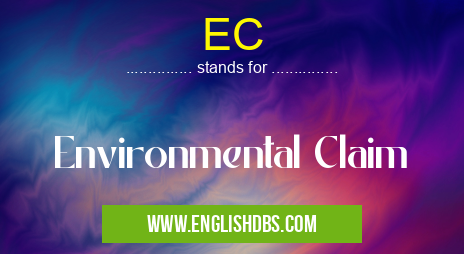What does EC mean in ENVIRONMENTAL
EC (Environmental Claim) refers to a statement or representation made by a manufacturer, supplier, or marketer regarding the environmental attributes of a product or service. It is a claim that the product or service is environmentally friendly or has a reduced environmental impact compared to other similar products or services.

EC meaning in Environmental in Governmental
EC mostly used in an acronym Environmental in Category Governmental that means Environmental Claim
Shorthand: EC,
Full Form: Environmental Claim
For more information of "Environmental Claim", see the section below.
Scope of ECs
- Sustainability
- Recyclability
- Biodegradability
- Reduced carbon footprint
- Energy efficiency
- Water conservation
Role in Marketing
ECs play a significant role in marketing, as they can:
- Attract eco-conscious consumers
- Enhance brand reputation
- Differentiate products from competitors
Regulation and Standards
To ensure accuracy and prevent misleading claims, many countries have established regulations and standards governing the use of ECs. These regulations aim to:
- Prevent false or exaggerated claims
- Provide clear and consistent guidance
- Improve consumer understanding and trust
Key Considerations for ECs
- Accuracy: Claims must be based on verifiable data and scientific evidence
- Specificity: Claims should be specific and avoid vague or general statements
- Comparability: Claims should be made in comparison to a relevant baseline or standard
- Transparency: Relevant information supporting the claim should be readily available
Essential Questions and Answers on Environmental Claim in "GOVERNMENTAL»ENVIRONMENTAL"
What does an Environmental Claim (EC) refer to?
An Environmental Claim (EC) refers to any statement, representation, or depiction that a product, service, or business practice has a positive or negative impact on the environment. It relates to the environmental attributes of a product or service and its production, use, or disposal.
Why are Environmental Claims important?
Environmental Claims are important because they can influence consumer choices and encourage sustainable practices. They provide consumers with information about the environmental impact of their purchases, allowing them to make informed decisions that align with their values.
What are the different types of Environmental Claims?
Environmental Claims can be categorized into various types, including claims about recyclability, biodegradability, energy efficiency, carbon neutrality, and sustainable sourcing. They can be positive claims (e.g., "made with sustainable materials") or negative claims (e.g., "not tested on animals").
What is the role of regulators in enforcing Environmental Claims?
Regulators play a crucial role in ensuring that Environmental Claims are truthful, accurate, and not misleading. They establish guidelines and regulations to prevent greenwashing (making false or exaggerated environmental claims) and protect consumers from false advertising.
How can consumers evaluate the credibility of Environmental Claims?
Consumers can evaluate the credibility of Environmental Claims by considering the following factors: the source of the claim, supporting evidence, specific and verifiable information, and third-party certifications. They should also be wary of claims that are vague, unsubstantiated, or use ambiguous language.
Final Words: ECs can be a valuable tool for businesses to communicate their environmental commitment and connect with eco-conscious consumers. However, it is crucial to ensure that ECs are accurate, specific, comparable, and transparent. Adhering to regulatory guidelines and engaging in responsible marketing practices helps maintain consumer trust and promotes sustainable consumption.
EC also stands for: |
|
| All stands for EC |
